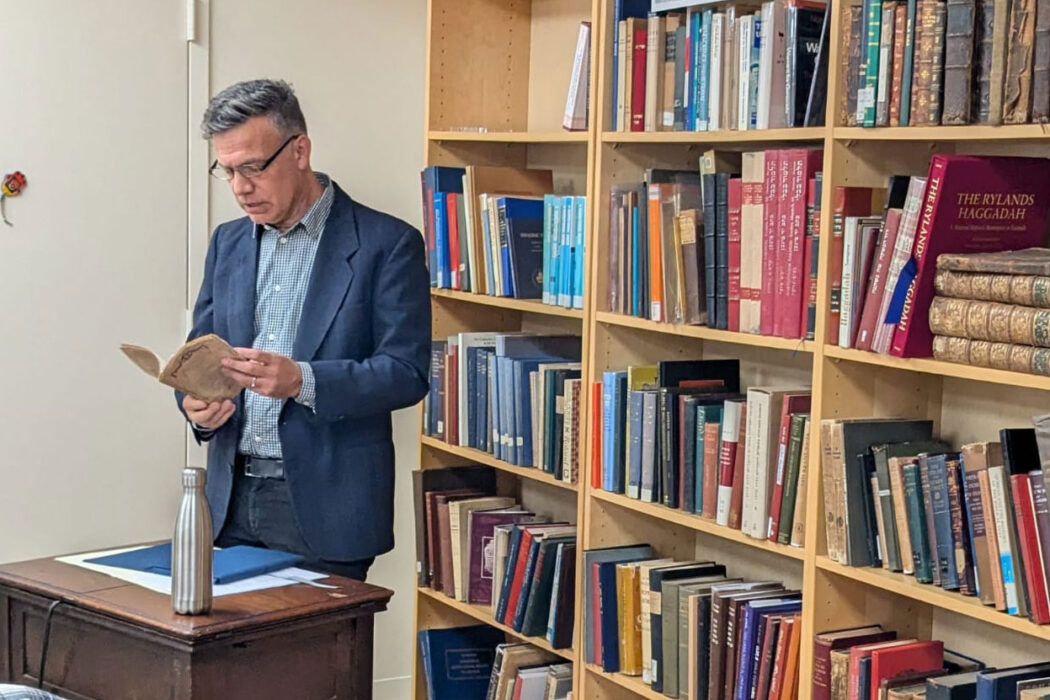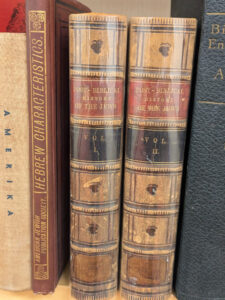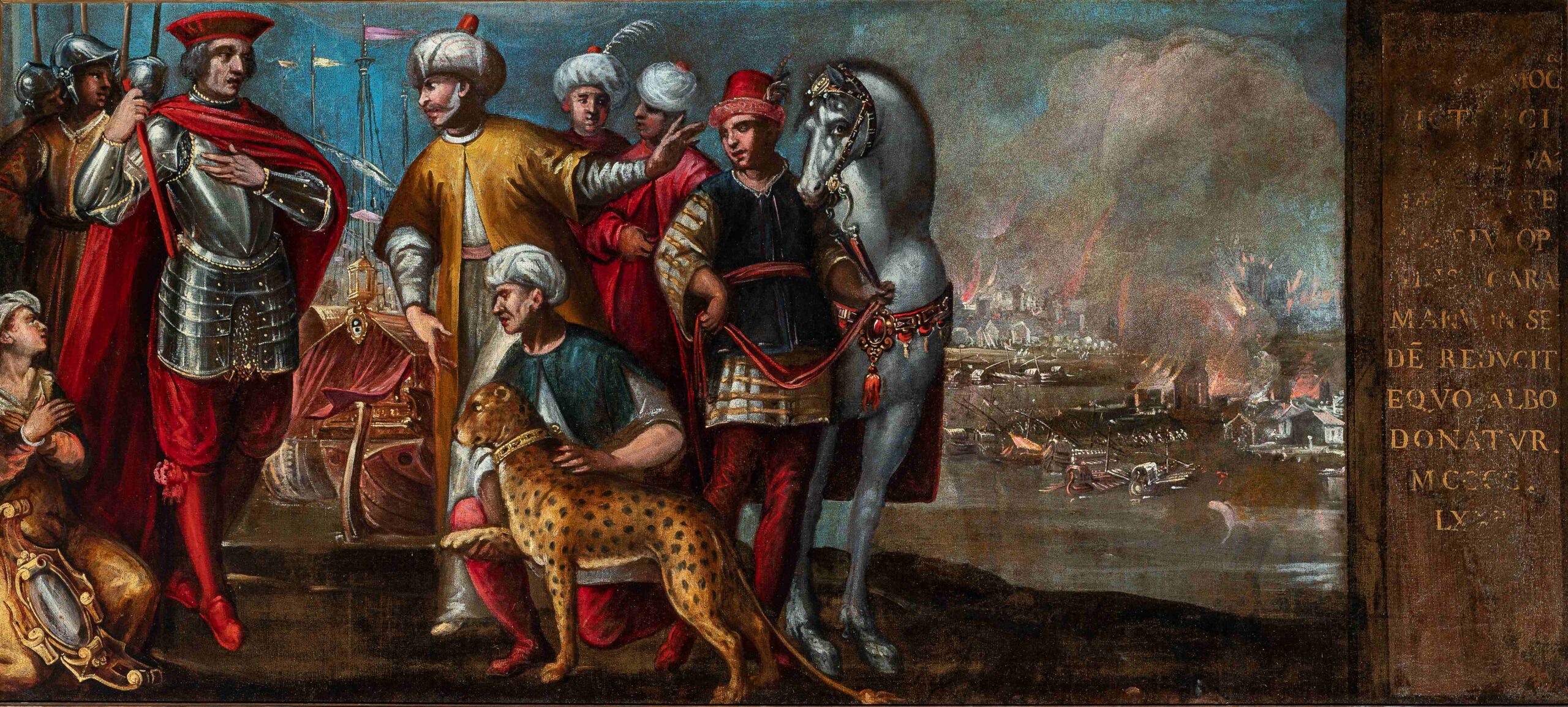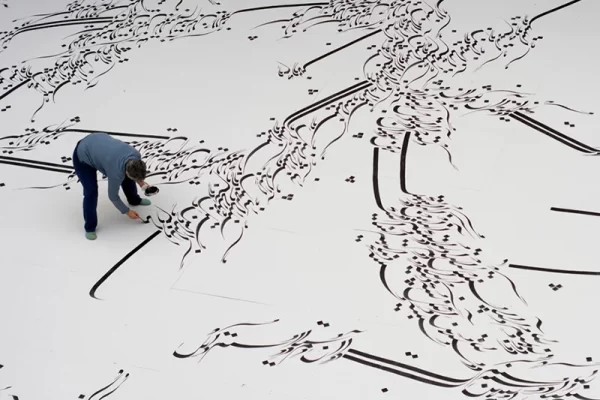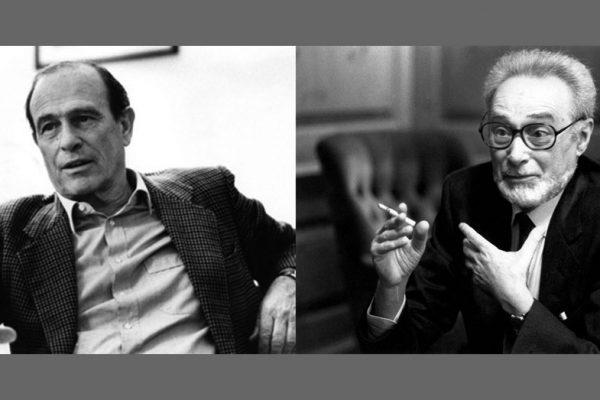Book trading and the making of open communities.
Dan Wyman is a leading international dealer in rare, out-of-print, unusual, and important Jewish books, periodicals, and ephemera. Since 1991 he has supplied primary and secondary materials in Jewish history to libraries, museums, scholars, and collectors across the globe. He buys, sells, and brokers important Jewish materials in all areas of the field, with a special focus on American Jewish history, Yiddish printing, and the Holocaust. Dan Wyman Books issues fully annotated illustrated catalogs several times a year. His warehouse with an inventory of over 30,000 titles is located in the East Williamsburg section of Brooklyn. Growing up in a family of historians and refugees, Dan was always drawn to exploring the past through objects and literature. His favorite holiday was the local public library’s annual book sale. While working as a union organizer, he was drawn to the antiquarian book trade, and, responding to the advent of the internet and the tugs of family life, he began to sell rare Jewish books full-time. It is a pursuit that one scholar noted “often anchors books to personal networks and to history itself, and defies the idea that they can be turned into commodities…” while at the same time, the bookseller has to develop their intimate understanding of the business of libraries, archives, private collections, and, above all, the history and stories that each book carries within. Dan invites you to visit him at Bookhouse, at his warehouse in Brooklyn, or online at DanWymanBooks.com
The passion for books and the belief in their centrality in passing knowledge and creating personal connections is at the core of the newly inaugurated BOOKHOUSE on the 6th floor of the Center For Jewish History, in Manhattan. BOOKHOUSE is a collaborative effort where all of its “dwellers” have long been involved with books: The American Sephardi Federation with collecting, Centro Primo Levi with publishing, and Dan Wyman (www.danwymanbooks.com) with trading in rare and out-of-print, unusual, and important Jewish books, periodicals, and ephemera.
To start out, Dan Wyman has filled a wall of the BOOKHOUSE with a selection of the books that he has been amassing in a warehouse from which he trades with libraries, collectors, and institutions for the past thirty-odd years. The initial selection is a unique grouping of circa 400 volumes— available for browsing and purchase— divided by subject: Early Hebrew Printing, The Mediterranean, France, Italy, Medieval Jewish Literature, Haggadot, Dead Sea Scrolls, Americana, The Samaritans, and miscellaneous books about Jewish communities around the world.
Wyman will also periodically give a talk on one or more of his books, as he did on November 11 with an engaging and timely presentation on “Post-Election Pledges to the Jews of Newport: George Washington’s 1790 Decree to Give ‘To Bigotry No Sanction’. On that occasion, he had an original publication of Washington’s pledge available for purchase.
In this informal conversation with Dan, we explore some aspects of his personal journey in and through Jewish books.
Alessandro Cassin: Watching you handle your books and hearing you speak of them, one senses your knowledge, respect, and passion for them. How did this interest begin for you?
Dan Wyman: I suppose at home, with my family. I grew up around a lot of books: my dad and his father were both historians; their field was American History, And my mother also came from a family of intellectuals. They fled Germany in 1939: while her father was a nerdy bookworm— always buried in a book— her mother was more of an exuberant literary butterfly type. Books were the family culture.
AC: Did you read much as a kid?
DW: I was around books, I had a strong interest in some, but I was by no means an avid reader.
AC: What books attracted you?
DW: I didn’t read many children’s books or youth fiction but I loved archeology adventures.
AC: Did that interest last?
DW: Well, I went to archaeology summer camp and later got my undergraduate degree in Mesoamerican archaeology. Some kids, when they walk around, they look up, at the trees, the birds, and the sky. Whenever I was hiking with family or friends I was always looking at the ground for artifacts. On a family trip once to Custer’s Battlefield in Montana I spotted teeth and bones sticking out of the ground, the area had recently been burned over. Based on the particular pipe-smoker’s stains on certain teeth, the Park service later identified the remains as belonging to a specific biracial scout in Custer’s Army and wrote it up in their newsletter. In essence, that’s what still happens to me when I am in a room full of books, I’m always looking for whatever jumps out as historically significant or unusual.
From an early age, I also read a lot about the Holocaust; It was an important part of my mother’s family history. One could say I became obsessed with it.
AC: Your early interest in Archeology somewhat echoes what you ended up doing. Searching for antiquarian, rare, out-of-print books is digging into remnants of a culture. Further, you work closely with libraries, which are a place for the preservation of the knowledge of the past. While the structure of most libraries has not changed much since antiquity, I imagine that the great Library of Alexandria or the Ulpia Library in Ancient Rome were not fundamentally different from ours. Still, there is one, perhaps the most intriguing ancient library, in Qumran Caves where the Dead Sea Scrolls were found, which is a sort of “archeological site.” Conserving scrolls in vases is quite different from books on shelves…
DW: Yes, but sometimes I do find items hidden away as if in a long forgotten cave. You know the show “Storage Wars?” I once bought a huge archive from a junk dealer who had purchased a storage locker that clearly had been filled by the family of a famous Jewish bibliographer shortly after his death–with literally ALL of his papers–not only manuscripts and scholarly letters, but shopping lists, utility bills, and birthday cards. To top it off, this scholar had been a great recycler of paper, so on a discarded manuscript page from one article, he would begin writing a new essay. Another sheet would have his notes for a book review on one side–and a flyer for a Pete Seeger concert at a local Jewish Center on the other. That is all part of the joy of this work, first of the hunt, and then of the understanding and interpretation of what has been found. Much like in archaeology.
AC: Today, you are a book dealer of a very particular kind; how would you define your activity precisely?
DW: It’s funny, but I don’t have a quick, thought-out answer.
My main focus is working directly with Judaica librarians, understanding what materials they need for their scholars and researchers, and then continuing to offer material specific to those interests. Of course, I also get orders every day from individuals who have found an interesting book on our website or in a catalog that they want to buy. But the core of what I do is working with librarians to develop high-level research collections.
AC: Librarians are very interesting, highly specialized, and often underappreciated workers.
DW: Indeed!
AC: There are significant differences between a trade one has learned through study and one learns by experience by doing. It sounds like you taught yourself the ancient trade of bookselling and book finding.
DW: You might say that. When I started out, it was in much more retail antiquarian bookselling. Now I primarily collaborate with librarians, which feels more like an academic role, even though I’m not in the academy at all.
AC: What segment of the book trade do you deal in, and do you know best?
DW: Jewish studies in general with an emphasis on Yiddish literature, the Holocaust, and American Jewish history. Of course, I am interested in and come across many other types of Jewish books, but those three categories are the niche that has come to define what I do most.
AC: Is there an aspect of your trade that you enjoy particularly?
DW: I love all aspects of what I do, but I particularly enjoy the hunt. The hunt for a particular book, a specific edition, something that a library, a collector or I, myself, really want. It’s a kind of detective work, with lots of research, dead ends, false clues, and then… the gratifying moment of actually finding the book or group of books.
AC: When and how did you turn your interest in books into a profession?
DW: It happened in stages. I suppose I started when I was 23 years old. My maternal grandfather had died a few years earlier, and we inherited his books. I took an interest in them. I was living in Western Massachusetts. And there was one Jewish antiquarian bookseller there. So I met him, observed what he was doing, and started to reach out to and meet potential clients. I never got any training for this: It was all just copying what I saw other people doing and putting my own spin on it.
At the time, I was a labor and community organizer. Once, I was assigned to work in Pullman, a small town in Eastern Washington State. I was there by myself at a university, training to be a labor organizer for clerical workers. Interestingly, the workers most receptive to the union were the librarians! In my free time, I would haunt the local used bookstores with my interest in Jewish history and the Holocaust. This was, of course, before the Internet. But there were bookseller’s magazines, like the AB Bookman, and it would list the dealers. I would buy something for $5 and see if I could later get $20 for it, maybe. To do this, I would type out a letter, put a stamp on it, and offer the book to other booksellers. Soon, I developed a sense of what books had a market. The hunt became my education.
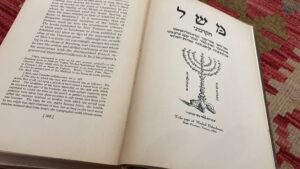 AC: Eventually, you began advertising catalogs of the books you had for sale…
AC: Eventually, you began advertising catalogs of the books you had for sale…
DW: It’s funny to look back sometimes. I’ll come across an old catalog from 20 years ago, I see that I was trying to inject my own politics into it. The world I lived in was far from the New York Jewish world with its great variety. My Jewish world then reflected much more of a mainstream political environment. So I was trying to inject some of my own concerns. Sometimes I would make a point of including, let’s say, Japanese American internment material within a Holocaust book list.
AC: Like the famous book collector Chimen Abramsky, you combined an interest in Jewish books and left-wing politics.
DW: I got active in leftist politics in high school, and I was really drawn to stories of the historic Jewish left. Yet I felt that the world I was moving into with Jewish books was more of a religious, mainstream world. And then, I met this collector, Al Moldovan. He had been an active socialist and was the doctor with Martin Luther King on the bridge at Selma. He was active in the civil rights movement and a prominent Jewish book collector who would show up at Jewish book auctions. It’s not that we got to know each other so well, but I recognized a kindred spirit in him. Being secular and left-wing, I had felt a little at the margins of the Jewish book trade, sort of the odd duck in the room, and then I met him! He died quite a few years ago. Coincidently, years later, after a colleague of my wife retired and was cleaning out of his basement, he called me, “Why don’t you come by and pick out books you want? And there I spotted a couple of issues of Sing Out Magazine from the 1940s, edited by Pete Seeger. I love folk music and Pete Seeger and I said: “Oh, those look really nice.” I grabbed them, turned them over, and saw that they had the hand-written mailing address of Al Moldovan, postmarked in 1947. Sometimes, you don’t find the books, books find you! In this case, I felt it was a much-appreciated little hello from the grave, from Al Moldovan, a collector with whom I’d always felt a real kinship.
AC: Can you share more anecdotes about a personal connection with former owners of particular books or libraries?
DW: There have been collectors I have never met, but I have established a connection with them by purchasing their libraries and getting to know them through their books, letters, and notations. The first significant library I bought was that of Guido Kisch, a scholar of German Jewish history. I bought the collection’s remains from Cornell after they took what they needed. Processing the collection was a real education: I went through it book by book, a book in one hand and an established colleague’s catalog of German Judaica in the other, learning about each book and its significance.
AC: Several times a year you issue beautiful, fully annotated illustrated catalogs of your books. Cataloging must be a large and vital part of your work?
DW: It is. And for me, it is a real joy. Every book is a classroom, a chance to educate myself. I need to find out as much as I can about each book: the place, time, and context in which it was produced, the controversies raging at the time, the author’s background, and how people responded. I want to find the mystery of a book, its hidden secret, what is special about it. At least the way I do this, working with librarians, everything has to have a written description. That means there’s a degree of labor input into every item that’s different from putting a book on a shelf and jotting a price in the corner as I would if I were running an open bookstore. But again, I enjoy the research and writing aspect a lot.
AC: How much time do you spend on each book?
DW: It depends on the volume; sometimes, it can be weeks or more, but I would say, at a minimum, it is a half-hour to an hour of concentrated research. My book knowledge stems mostly from cataloging and researching thousands of books over many years. I started with zero academic background in book history apart from Maya codices from the Yucatan. So it all just comes from cataloging material and then making connections, not necessarily going very deep in any one area. Just being able to put together a lot of different facts helps you recognize how a book fits into a historical context, or into a social or intellectual movement. Sometimes, I feel like my knowledge is a mile wide and an inch deep.
AC: You are very modest; your expertise is quite evident. I imagine your research time is then reflected in the price of the books.
DW: Certainly. At the same time, I like to have books at many different price levels. It’s a pleasure to sometimes offer a beautiful nineteenth-century book for as little as twenty or thirty dollars. Some people believe that book collecting is only for the very wealthy, but it is still possible to begin a significant collection of Jewish books for very reasonable prices.
AC: How many books do you have at your warehouse at the moment?
DW: Over 30.000 volumes right now, of which 11.000 are fully cataloged and listed on our website while the others await to be described and offered out
AC: We spoke about the subject matter, but what time span do you specialize in?
DW: The bulk of what I trade in, my area of expertise, is roughly from the mid-1700s to the mid-1900s. However, particularly when I acquire entire libraries, I end up with some much earlier volumes and also more recent ones. But again, being exposed to what you WEREN’T after, what you DIDN’T expect, that always keeps things interesting!
AC: Private book collections as we know them began in Europe between the 16th and 17th centuries, coinciding with the invention of the printing press, which made books more accessible and attractive for the increasingly literate public. Now, book collectors are virtually all over the world.
DW: The history of how private and public libraries came to be is so interesting. As people like books, they inevitably start collecting.
AC: Have you ever had an actual antiquarian bookshop or done more retail-oriented work?
DW: I used to sell at book fairs and exhibit at Jewish academic conferences: it’s a lot of work transporting and setting up, just to box everything you didn’t sell back up after a few days to ship home. But in person trade lets you talk to people and interact with them together with the books, all at the same time, sharing your knowledge, and gaining their knowledge, as you discuss the book in front of you. That’s one of the things I am really looking forward to doing here at our BOOKHOUSE.
AC: The way you conduct your business, I imagine, allows you to manage your time much more freely than if you had a traditional store.
DW: For sure, and through the Internet today, we all have an increasingly broad market. I sell mostly in North America, but I have clients I work with on every continent. Well, not on Antarctica, not yet anyway. Every year I am shipping books to scholars in Japan, in China, in Israel, in South Africa, in the UAE, all over. My work style developed in close connection to my personal life. In the late 90s, my wife and I wanted to start a family. I was a community organizer, out late at meetings a lot, and her health was deteriorating. I had this weekend book hobby business on the side. The thought was, let me try selling books full time. In a way it seemed like a strange gamble to take as you’re starting a family, like what you want is stability, not some crazy new idea, but the hope was that it would give me more time at home. And it did. My wife eventually did not make it and I raised my twin daughters from age 6 to 11 alone. I was able to do it by working from home, two decades before it became so normalized in the pandemic. I was always on the laptop working on the books. I would take my daughters to music lessons. When they were in class, I was working in the lobby. And then I would pick them up, get them home, have dinner, get them into bed, and then work at home.
AC: The time when you began your business corresponded with the rise of bookselling and auctions over the Internet; perhaps that made having a brick-and-mortar store less significant.
DW: Yes, the one advantage I had over my colleagues when I was starting out was that the Internet was coming into existence. I was 15 years younger than the established people who knew far more about the business and had the relationships. But I had that slight advantage, which may have also pulled me in that direction to follow the path that would let me get my foot in the door.
AC: Today, antiquarian bookstores coexist with many internet sites such as yours. My impression, but I need more actual data, is that the pricier end of the market trades mostly in person. Is that correct?
DW: Personal relationships are always key. Even more so for specialized, high-priced items. The Internet has changed all aspects of book trading to a degree. If by “the Internet” we are including sending an email to a client to say ‘I have this book,’ then we realize that the two worlds, in person and online, are somewhat complementary. But that’s different from just listing a book in an online store and waiting for clients. I cannot expect even the librarians I work with most closely to check my site constantly. Instead, I customize my offers to them. I will send them an email or a catalog link listing twenty items I expect they may be interested in. Even my work online is individual-to-individual based: “Here’s a list of 20 items I have that should interest you.” Maybe that’s not an in person sale, in the old pre-internet way, but it is still all about the relationship, the understanding of a collector’s or librarian’s specific needs.
AC: To sell books, you must first buy them; what are your main sources?
DW: There are many different ones; I always look at books for sale in bookshops or online or when I hear from people selling their libraries or individual volumes. Over the years, I would say that one of my main sources has been libraries that have duplicates they no longer need. One of the libraries that became my most important source for books may be a telling example: I literally would call them every three or four months and leave a message for the person in charge of their duplicates. I just kept at it until the right person answered the phone one day and said: “Sure, this is a good time. Come in.” So in I went, and that has become a very steady and reliable source of books for me to this day.
AC: Being a one-man operation, it must have advantages for both your clients and your providers. They get to know and trust you.
DW: Yes, and it goes both ways. I really prioritize relationships and tend to them, like an important garden that you water with care.
AC: Your work, alone, with the freedom of disposing of your time, reminds me of the condition of an artist: the solitary creative act. Do you miss the teamwork?
DW: I have to say, I like working by myself. And I see a similarity with an artist working in his studio; when I do my research, the rest of the world fades away. In other parts of my life, I really enjoy being part of groups and with people, but my work has always been a place to be in flow, just me and the books. I always imagine my grandfather, my mom’s dad, the bookworm. He was not a college professor who engaged with students and colleagues; he had a more solitary life of study. Over the years, I have had employees, but I have always enjoyed doing the bulk of the work myself.
AC: I know you often search for a specific book or edition for a client; are there books you have been hunting for yourself?
DW: Sure, there are books that I watch out for and collect for myself. I’m very interested in this idea of libraries and books as a means for people to find escape or freedom in situations where they are imprisoned. For a long time, I’ve been fascinated by the fact that the Terezin Concentration Camp had a library, and I still find books with the library stamp in them. Actually, they used several different stamps that I have learned to recognize –The stamps don’t have the word “Terezienstadt” in them, so you have to know what you’re looking for— It was a good size library, so potentially there are thousands of those books around: they come up in unexpected ways. I keep those items for myself and sometimes have thought of doing something special with them. The stamp says “Ghetto Book Center.” But sometimes, the books were not even stamped, they just have a recognizable spine label, but, again, you have to know what it looks like.
AC: Do you still find those books?
DW: Recently, a month ago, I bought a scholar’s library and much to my delight, there were two books with the stamp. I’m also always interested in 1920s Yiddish modern design. In particular, there’s a cartoonist, William Gropper, much of his artwork shows up in publications of the American left, a lot of cartoons and magazine covers, and I sometimes keep those for myself, and then after a year or two, I may let them go. Those are the things I am particularly drawn to. The most fun part of this work is always the hunt and the match-making. Once I find the rare book, the hunt is over, and I feel no need to keep it. Then the match-making begins: I have to find the right home for it. That’s another piece of the work I love. I do enjoy being around the books at my warehouse or at home, but finding and then placing a book is where I get the most joy.
AC: In what ways do you feel that your work has shaped you?
DW: The most direct answer is that you develop a particular way of being If you work alone. It’s a particular way of working, spending 8 hours a day just by yourself. There’s that expression that when you love how you make your living, you never work a day in your life. And I feel like I experience that every day. It’s not that I am happy all the time, but what I do most days is very meaningful to me.
AC: You are planning to spend a year in Berlin soon, a city with a long tradition of Jewish publishers and booksellers yet also the shadow of the burning of books when in 1933 Hitler had twenty thousand Jewish books or books by Jewish authors burned at Bebelplatz. Today, in the same square stands the Tower of Books in memory of what happened…
DW: My wife Marcela has recently retired, and she and I wanted to try something different. We spent several months in Berlin and liked it very much. My German is good enough to work from there. Of course, I know the stark history, but at a gut level, I don’t have the same sort of bad feeling about Germany that some Jews have. In fact, I think that going back, as a Jew, is a statement: we belonged in Germany before and we still belong there. My mother and her parents fled Germany in 1939 and went to Chile. My grandparents divorced, and both of them, separately, moved back to Germany in the ’60s and ’70s. I grew up visiting them there: that was my grandparent’s country. I have internalized that feeling, it’s part of my personal geography. Ours was not a family where you didn’t buy a German car and things of that sort. My feelings about this probably derive from my grandparent’s strong identification with that country, no matter what they endured there. It feels very normal to me to be in Germany. People travel, books travel, and all this mobility is integral to life. I have books that were printed in the United States, went to Germany, and have stamps that show that they came back to the US after the war. Now I will literally be taking them back to Germany with me. It feels like this is all part of the transatlantic back and forth of Jews and Jewish books.
AC: While in Berlin, you will continue to have a presence here at the BOOKHOUSE; how do you imagine this?
DW: One of the exciting things about being part of BOOKHOUSE is a chance to exhibit books in a very comfortable way. People sometimes come to my warehouse in Brooklyn, but it’s a warehouse, and a lot of the books are in boxes. I can pull things out, but it’s very different from being in a beautiful, comfortable space with a selection. I have brought here books that have a nice appeal, that people can pick them up and open up. They’re visually attractive, and they feel nice.
AC: What kind of books and rotation can we expect you to bring to the BOOKHOUSE in the coming months?
DW: I’d like to, at any given time, have between four and five hundred books here for people to browse and buy. I think it would be interesting to focus the selection around a specific topic so that people aren’t coming in to see an assortment of Jewish books but they’re coming to see five hundred Jewish art books or books on the Holocaust, on German Jewish, or on American Jewish history. That will allow someone with a serious interest to come in and know they will see material they have never seen before.
AC: The connections between the Sephardic world and the early American Jewish world greatly interest Centro Primo Levi. Among the books you brought to the BOOKHOUSE, there is A History of the Jews of Philadelphia by Henry Samuel Morais.
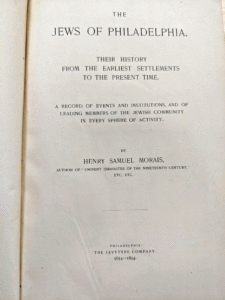 DW: You mentioned Morais’ classic The Jews of Philadelphia–that’s a great example of a book that is both truly an important reference for our learning about the Jewish history of Philadelphia–and is itself an important document, from a time when American Jewish history was just beginning as a field.
DW: You mentioned Morais’ classic The Jews of Philadelphia–that’s a great example of a book that is both truly an important reference for our learning about the Jewish history of Philadelphia–and is itself an important document, from a time when American Jewish history was just beginning as a field.
Morais published the book in 1894, less than 2 years after the founding of the American Jewish Historical Society in 1892, and less than 10 years after his father, Livorno-born Hazzan and scholar Sabato Morais, helped establish the Jewish Theological Seminary of America.
This is indeed a moment in American Jewish history: The heavily Sephardic and German establishment are nervously welcoming their Yiddish-speaking brethren from Eastern Europe in the great migration. The old guard definitely wants to make sure that the new immigrants and all future generations of Jews–and non-Jews–understand the important role these early largely Sephardic communities had in the American Revolution and in shaping the new nation.
Incidentally, this is not the only cultural reckoning happening in America at this time–this is also the period, starting with the end of Reconstruction in 1877, of the re-establishment of Jim Crow in the South, the emergence of the Klan, and the dismantling of Black voting rights and electoral power. So it is an intense time to establish who really has a claim on American history, and who made it the powerful nation it has become. Jewish scholars of the time want to make sure we are written into that history.
It’s interesting to me that Henry later ends up, himself, as Hazzan of two of the most famous early Sephardic Colonial American Jewish congregations: Congregation Mikveh Israel in Philadelphia, where his father had been a Rabbi and Hazzan, and at Jeshuat Israel congregation, in Newport, Rhode Island, perhaps the most famous historical Jewish congregation in America. We discussed the history of Jeshuat Israel at our first Bookhouse event back in November.
So in Henry Morais, we see the natural interests of someone raised in an Italian-Portuguese-Jewish home that prioritized wide-ranging Jewish education; and then those interests blossom as part of the growing movement to document the rich history of Jews in America.


